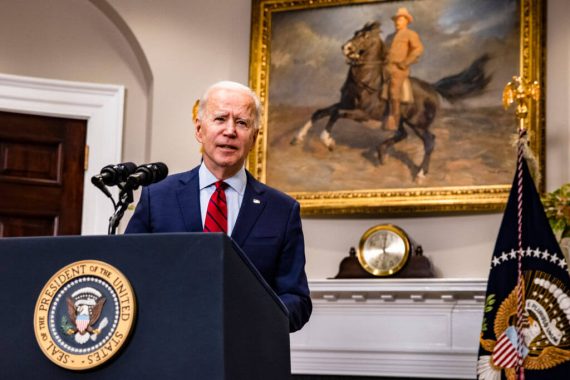The inauguration of Joe Biden took place on January 20, 2021, after a troublesome process that ended with a mob attack on the United States Capitol. The 59th U.S. presidential elections were carried out with significant concerns and expectations, especially in the Middle East. As Donald Trump marked a turn in the U.S. perspective on the Middle East, almost all of the region’s political leaders were rooting for a less-likely Republican win in the elections.
However, Trump suffered several blows to his prestige throughout his term in office which eventually turned into an election win for the Democratic Party in November. Under these circumstances, the current pressing question regards the impact of the new Democratic administration under Obama’s former reliable aide and current U.S. president Joe Biden on U.S. foreign policy towards the Middle East.
The Obama administration cornered some of the Arab states to the extreme on several issues and created impediments on security provision and the economy. Joe Biden was an integral part of these policies and had a substantial responsibility in these decisions. A brief synopsis of these issues reveals that the most salient stalemates regarded certain Middle Eastern countries’ support for Jihadist organizations, neglected security demands, and the unresolved Palestinian issue.
The Obama administration used the 9/11 attacks as leverage against the Gulf Cooperation Council (GCC) countries, particularly Saudi Arabia, which disturbed bilateral affairs as Saudi assets were jeopardized with 28 ongoing lawsuits. Another issue was the neglected and stalled military procurement deals worth over $130 billion as Egypt, Saudi Arabia, and the United Arab Emirates were struggling with the outcomes of the Arab Spring. The Obama-Biden team did not allow the Arab countries to receive the aid that would support them in the political turmoil during and after the revolts which threatened to put an end to the monarchies.
The U.S.-Israel bilateral affairs also suffered great turbulences due to Obama and Biden’s desire to stop the illegal Israeli settlement advancements in the occupied Palestinian territories. The foreign policy choices regarding the Palestinian issue were among the fundamental reasons that brought the Democratic administration to an end in 2017.

VIDEO: How Will Biden Change the US Middle East Policy?
The reasons behind the Saudi-Emirati unpleasant experience during the Obama-Biden administration are probably the issues that will keep the Middle East envoys to the U.S. busy in the near future. There were substantial military procurement deals just before the end of Trump’s term, among others, with the UAE for F-35 aircraft (50), AMRAAM long-range missiles (802), and MQ-9B UAVs (18) worth nearly $24 billion, and with Egypt and Kuwait for AH-64E attack helicopter modernization and exports (51).
It was announced that the foreign military sales that were approved at the last minute by Trump were going to be re-assessed by the Biden administration which caused serious concerns for the receiving parties. These concerns were confirmed when the Biden administration decided to halt immediately the foreign military sales to Saudi Arabia and the UAE, almost one week after the inauguration. President Biden clarified that U.S. foreign policy was not planning to help the Arab states involved in the Yemeni civil war. As this decision was ratified by Biden’s statement on the Yemeni civil war, the White House decided to stop any support for Yemen’s offensive operations, including the relevant arms sales.
The UAE was able to snatch the F-35, MQ-9B, and AMRAAM deals thanks to the Abraham Accords. However, the majority of these weapon systems are offensive and quite likely to be used against the Houthi rebels. Saudi Arabia can also suffer extensively from a U.S. foreign policy that does not actively engage against the Houthi rebels. The military procurement deals signed in 2017 worth $110 billion are not secure from this turbulence.
Recommended
Furthermore, the Biden administration has already reversed the U.S. designation of the Houthis as terrorists. The U.S. retreat from offensive solutions in Yemen is going to jeopardize the majority of the plans and operations led by Saudi Arabia and the UAE. There will be sanction arguments and discourse to enforce the complete Saudi-Emirati retreat from Yemen in the coming years.
The Yemeni civil war and Houthis are going to be a tremendous impediment to the U.S. relations with the GCC countries. This process may evolve into a conflict between the U.S. and Saudi-led countries regarding the offensive against the Houthi rebels – a conflict that will be similar to the tensions Turkey experienced as a result of Syrian border security and the YPG/PKK activities there.
The most significant practical implication of a Democratic administration in the U.S. seems to revolve around security concerns and military operations. However, other substantial issues still undermine bilateral affairs. President Biden’s position on the Abraham Accords was favorable during and after the Arab states reached a historic deal with Israel. However, it was clearly stated that the Biden-Harris administration is going to work towards reaching a two-state solution and that it will only partner with those who believe in this solution.
The two-state solution certainly irritates the Israeli administration, which indicates escalated tension between the U.S. and Israel in the short term. The Palestinian side rightfully complained about the illegal settlements built throughout its occupied land, and always received support on this front from the Obama-Biden administration. This support seems likely to be revived under the Biden-Harris leadership with a larger interest in the coming years.
The U.S. backlash over the Saudi-Emirati support for Jihadist groups is not expected to be as strong as it was during the Obama administration since the former have significantly reduced their illicit support for these organizations. However, the Biden-Harris administration may force the Saudi-Emirati administrations to end their activities in Yemen, Sudan, and Libya.
It is expected that the current U.S. administration will have a say in the ongoing turmoil in Libya. The Saudi-Emirati partnership should expect to be cornered in Yemen and in Libya in the near future as the honeymoon with Trump has come to an end and swift reversals in U.S. foreign policy and future impediments are on the horizon.





